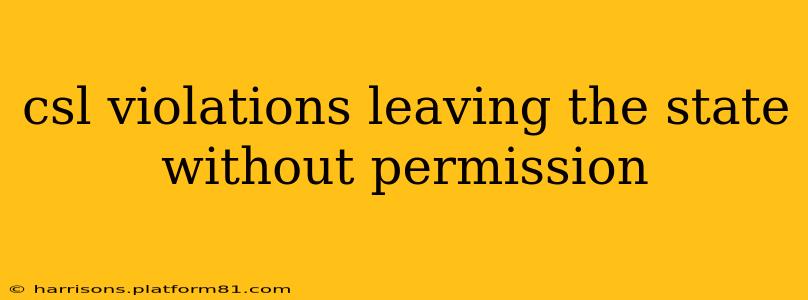Community Supervision (CSL) involves strict adherence to specific rules and regulations. One of the most serious violations is leaving the state without prior permission from your supervising officer. This article explores the ramifications of such violations and answers common questions surrounding this issue. Understanding the potential consequences is crucial for anyone under community supervision.
What Happens if You Leave the State on CSL Without Permission?
Leaving the state without prior authorization is a significant breach of your community supervision agreement. The consequences can be severe and vary depending on the state, the specifics of your case, and your history. Generally, however, you can expect repercussions such as:
- Immediate arrest: A warrant for your arrest will likely be issued. Law enforcement will be actively searching for you across state lines.
- Revocation of probation or parole: This means your community supervision will be terminated, and you may face the original sentence, potentially including jail time.
- Increased sentence length: Depending on the severity of the original offense and the circumstances of your violation, you could face a significantly extended prison sentence.
- Further legal charges: You may face new charges related to escaping custody or violating your parole conditions, adding to your legal troubles.
- Damage to your future prospects: A violation of this magnitude will negatively impact your chances of future employment, housing, and other aspects of your life.
Can You Leave the State on CSL for a Family Emergency?
While family emergencies can be incredibly stressful and urgent, it's crucial to contact your probation or parole officer immediately. Do not simply leave the state without authorization. Explain the situation thoroughly and request permission to travel. Your officer may:
- Grant permission: They might allow you to travel for a limited time, possibly with specific conditions attached (like regular check-ins).
- Arrange alternative solutions: They may explore other options to address the emergency while keeping you within the bounds of your supervision.
- Deny permission: Depending on the circumstances and the nature of your case, they may not approve your request.
What is the Process for Requesting Permission to Leave the State?
The process for requesting permission to leave the state varies by jurisdiction but generally involves:
- Submitting a written request: This should be a formal request, clearly stating your reasons for wanting to leave the state, your proposed travel dates, destination, and contact information.
- Providing supporting documentation: You might need to provide proof of the emergency or the reason for your travel.
- Attending a meeting with your probation or parole officer: They will review your request and discuss the potential implications.
- Getting written approval: If your request is approved, you will receive written permission outlining any conditions or restrictions.
What are the Different Types of Community Supervision?
Community supervision encompasses several types, including probation and parole. Both involve following rules set by the court or parole board, but they differ based on when they are imposed:
- Probation: This is imposed after a conviction and before incarceration. It is an alternative to jail or prison time.
- Parole: This is granted after a period of incarceration, allowing for supervised release before completing the full sentence.
How Long Does it Take to Get Permission to Leave the State on CSL?
The timeframe for obtaining permission to leave the state varies significantly. It depends on the complexity of your case, the urgency of the situation, and the workload of your probation or parole officer. It's best to submit your request well in advance to allow ample processing time.
Disclaimer: This information is for educational purposes only and should not be considered legal advice. Always consult with a legal professional for guidance specific to your situation. The consequences of violating community supervision can be severe. Understanding the rules and seeking permission before leaving the state is crucial to avoid significant repercussions.
